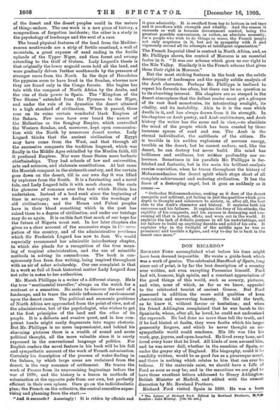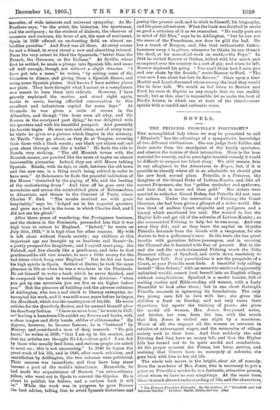RICHARD FORD accomplished what before his time might have been
deemed impossible. He wrote a guide-book which was a work of genius. The celebrated Handbook of Spain, long since out of print, is by far the best description of a country ever written, not even excepting Pausanias himself. Ford had wit, humour, high spirits, and a constant appreciation of the good things of this world, such as scenery, pictures, and wine, none of which, as far as we know, appealed to the celebrated tourist of ancient Greece. But Ford possessed in addition the more solid qualities of keen observation and unswerving honesty. He told the truth, as he knew it, without favour or hesitation; and when his friend Addington complained that he was harsh to the Spaniards, whom, after all, he loved, he could not understand the reproach. He had done no more than tell the truth, and if he had hinted at faults, they were faults which his larger generosity forgave, and which he never thought an un- sympathetic world could condemn. His life was like his work, gay, joyous, and open-hearted. He lived every hour, and loved every hour that he lived. All kinds of men amused him, and he was never dull, whether in the sunshine of Spain, or under the greyer sky of England. His biography, could it be candidly written, would be as good fun as a picaresque novel, and there is nothing which relates to him that can ever be tedious. If the materials exist, we should have a Life of Ford as soon as may be; and in the meantime we are glad to have these excellent letters addressed to Henry Addington, British Minister at Madrid, and edited with the utmost discretion by Mr. Rowland Prothero.
Richard Ford visited Spain in 1830. He was a born
by Eoi]and Prothero,
21se Letters of Richard Ford. Edited traveller, of wide interests and universal sympathy. As Mr. Prothero says, "to the artist, the historian, the sportsman, and the antiquary; to the student of dialects, the observer of manners and customs, the lover of art, the man of sentiment, Spain in 1830 offered an enchanting field, an almost un- trodden paradise." And Ford was all these. At every corner he met a friend, in every street a new and absorbing interest. From the very outset he liked the Spaniards, "better than the French, the Germans, or the Italians." At Seville, where first he settled, he made a plunge into Spanish life, and came off well enough, though not without a slight disaster. "I have got into a mess," he writes, "by asking some of the Grandees to dinner, and giving them a Spanish dinner, and using some Spanish plates. God knows I have neither plates nor plate. They have thought what I meant as a compliment was meant to turn them into ridicule. However, I have gravely explained the matter, and stand right again, rectus in curia, having afforded conversation to this excellent and industrious capital for some days." At Granada he was given a suite of rooms in the Alhambra, and though "the lions were all adty, and the flowers in the courtyard past dying," he was delighted with his quarters and with his beautiful prospect. And presently his travels begin. He sees men and cities, and of every town he visits he gives us a picture which lingers in the memory. At Tarifa "they go about, as they do at Tangier, covering their faces with a black manta; one black eye shines out and goes dean through one like a bullet." He finds the ride to Ronda very striking. "The old Moorish towns with the Moorish names, are perched like the nests of eagles on almost inaccessible pinnacles. Indeed, they are still Moors talking Spanish. Ronda, with its tajo, or cleft, between the old town and the new one, is a thing worth being robbed in order to have seen." At Salamanca he finds the peaceful habitation of the Muses "disturbed by the piping of fife, and the beating of the soul-stirring drum." And then off he goes over the mountains and across the uninhabited plain of Estrersadura to Aleantara, and thence to the Convent of Yuste, where Charles V. died. 'The monks received me with great hospitality," says he, "lodged me in the imperial quarters, and gave me a bed in the room in which Charles died, and I did not see his ghost."
After three years of wandering, the Portuguese business, and the cholera in the Peninsula, persuaded him that it was high time to return to England. "Indeed," he wrote on July 26th, 1833," it is high time for other reasons. My wife is left alone without female society; my children at this important age are brought up as heathens and Spanin-ds, a pretty prospect for daughters ; and I myself must purgi like Falstaff, and live cleanly like a gentleman, and take to that gentlemanlike old vice avarice, to save a little money for the bad times which hang over England." But he did not leave his high spirits in Spain. Settled at Exeter, he took the same pleasure in life as when he was a wanderer in the Peninsula. He set himself to write a book, which he never finished, and he compared the task to travelling in the Asturias : "when you get up one mountain you see five or six higher before you." But the pleasure of building and the adverse criticism of Addington, who was a sad check to literary enterprise, in- terrupted his work, and it was still some years before he began the Handbook, which was the masterpiece of his life. He wrote articles for the Quarterly Review, and he amused himself after his desultory fashion. "I have no news here," he wrote in 1837, leading a humdrum life amidst my flowers and books, with a clean tongue and dirty hands, oblitue et obliviscendus." By degrees, however, he became famous; he is " buttered " by Murray, and considered a man of deep research. "Do you know," he writes in 1838, "that I am up in the market, and that my articles are thought No.1A,—clean grit P I am fed by those who usually feed lions, and curious people are asked to meet sac; this is not unamusing." In 1840 he began the great work of his life, and in 1845, after much criticism, and cancellation by Addington, the two volumes were published. Their success was immediate, and they have long since become a part of the world's inheritance. Meanwhile, he had made the acquaintance of Borrow, "an extraordinary fellow, who went out to Spain to convert the Gipsies. He is about to publish his failure, and a curious book it will be." While the work was in progress he gave Borrow the best advice, telling him to avoid Spanish historians and poetry like prussic acid, and to stick to himself, his biography, and his queer adventures. When the book was finished he wrote as good a criticism of it as we remember. "He really puts me in mind of Gil Bins," says he to Addington, "but he has not the sneer of the Frenchman, nor does he gild the bad. He has a touch of Bunyan, and, like that enthusiastic tinker, hammers away a its gitano, whenever he thinks he can thwack the devil, or his man-of-all-work on earth,—the Pope." In 1844 he visited Borrow at Chilton, talked with him much, and scampered over the country in a sort of gig; and when he left, Borrow deplored his going. "You can't think how I miss you and our chats by the fireside," wrote Borrow to Ford. "The wine now I am alone has lost its flavour." Once upon a time Hazlitt and Lamb discussed whom among the dead they would like to hear talk. We would as lief listen to Borrow and Ford las cosas de Espaila as any couple that we can readily recall; but as this, alas ! is impossible, let us make the best of Ford's letters, in which one at least of the interlocutors speaks with a candid and authentic voice.



















































 Previous page
Previous page